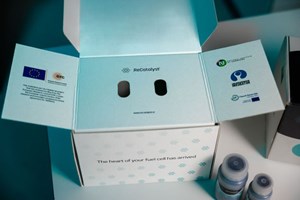News
ReCatalyst and ionysis receives grant to make fuel cells for heavy-duty applications
The Slovenian start-up ReCatalyst and the German start-up ionysis have been successfully selected for funding under the prestigious EIC Transition call and invited to sign the grant agreement with a funding volume of €2.5 MM. Even before ionysis and ReCatalyst were founded, the founding teams worked closely together scientifically. Since 2020, they have laid the groundworks for EIC Transition through joint publications and mutual research visits at their respective research institutions—the University of Freiburg and Hahn-Schickard for ionysis, and the Slovenian National Institute of Chemistry for ReCatalyst.
"We are really pleased that after three years of joint scientific development, we can finally strengthen our collaboration through EIC funding. The collaboration, which in the past was nurtured solely by enthusiasm for each other's research and a shared ambition to drive decarbonization through better, greener and more cost-effective H2 technologies, will now be solidified and put on a secure financial footing," said Dr. Matthias Breitwieser, CTO of ionysis.
"The scope, content and timing of the funding fit perfectly with the development paths of our young companies. We can now expand our joint development activities and hope to significantly shorten the time to market for our technologies," said Dr. Matija Gatalo, CTO of ReCatalyst.
With a project volume of approximately €2.5 MM, the Enabler project combines the innovative technologies of the two start-ups with the aim of making fuel cells for heavy-duty applications more cost-effective, environmentally friendly and improve performance. ReCatalyst has developed its own technology to produce novel electrocatalysts based on platinum alloys, which enable higher performance and durability of catalysts.
ionysis uses ReCatalyst’s catalysts for its membrane electrode assemblies (MEAs), which are based on new, fluorine-free materials. The goal of the project is to develop and validate fluorine-free MEAs that exceed current state-of-the-art performance and durability targets. To evaluate the MEAs in real-world applications, the established fuel cell stack developer EKPO Fuel Cell Technologies GmbH joined the consortium as an associated project partner. To shorten the time to market for innovations, EIC Transition also includes activities to prepare for their commercialization.
"This two-pronged set-up of EIC Transition gives us a tremendous push as early-stage startups. It recognizes the fact that not only do we need to bring our technological innovations to market readiness, but we also need to be ready to successfully commercialize them. Through EIC Transition, we have the resources to build our business case and refine our business model so that our technologies have a real impact and our companies become commercially successful as soon as possible," said, Lisa Langer, CFO of ionysis.
Tomaž Bizjak, CEO of ReCatalyst, said, “This success reflects our constant perseverance of excellence. The challenge of achieving carbon neutrality deserves our full attention and the H2 economy will play an important role. The EIC Transition project enables us to form a long-lasting partnership along the very demanding value chain, while once again confirming that European Union is investing well to counter economical and societal challenges of the next decade and beyond.”


